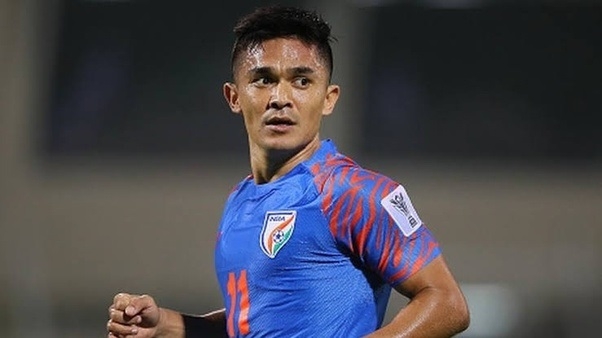Renaissance Point ! ?
25 May 2024 09:24:52

By Vijay Phanshikar :
New Delhi :

The iconic Sunil Chhetri announced his decision from international football after his FIFA World Cup qualifying match against Kuwait on June 6, bringing the curtains down on a career that has been unparalleled in India football for its longevity and consistency.
The long-serving national team captain announced his decision via a social media post.
THE most critical issue with Indian football is that the country has not been able to evolve what can be called as ‘football culture’ despite the fact that the game is being played in the country for long. There have been many truly great players who shone with their superb footballing skills to earn even international applause.
Yet, as the legendary Sunil Chhetri looks to hanging his boots after his June 6 encounter with Kuwait team in the World Cup qualifier round, the issue of absence of a pronounced football culture rises from the ground -- to trouble those who have concerned themselves with the game and its progress in India. A good task appears to invite them to look at this aspect of Indian football again.
Sunil Chhetri’s absence from international football will be felt in all seriousness simply because he brought to the game not just his personal qualities as a player and as a leader, but also created model of excellence that propelled him to the top of world football on sheer individual merit -- without the advantage of a team of equal standard -- and without the support of the football ecosystem that matches the ones available in other football-playing countries. Despite those lacunae, Sunil Chhetri proved talismanic in Indian football.
Very rarely did Sunil Chhetri stay out of play on health reasons. Very rarely was his wise counsel not available to the country’s football establishment in his long career. Even though he is opting out of international football almost “on instinct”, as he himself said, Sunil Chhetri may make himself available in domestic circuit.
In that capacity, too, he will prove to be a role model for youngsters -- if the football establishment has the energy and inclination to use him as a totem pole of excellence.
Over time, Indian football has produced quite many great names by every definition -- like Mohammad Salim (1926-38); P.K. Banerjee (1954-67); Sailen Manna (1940-60); Tulsidas Balram (1956-62); Jarnail Singh Dhillon (captain during 1965-67); Chuni Goswami (who later played cricket at national level); Baichung Bhutia (1993-2015) ...! This list is much longer, to be sure. Currently, too, Indian football can boast of at least 7-8 names of great players like Subrata Pal; Gurpreet Singh Sandhu; Sandesh Jhingham; T.J. Singh; Pronay Halder; Kumam Udanta Singh; Ashique Kuruniyan. The country also boasts of many a football club across the geography playing professional game and attracting crowds.
Despite all this, India’s status internationally is restricted only to be a regional entity with little chance of breaking into the global top league at least for some more time. And the reason is that the country has not been able to evolve football culture that will ensure a continuous flow of young talent into the game and playing competitively and competently. Some nationally known organisers and managers did make some attempts in this direction, all right, but to little practical avail.
Seen from this angle, a Sunil Chhetri or a couple of his likes will make no positive difference to the overall standard of the game in the country.
This brings us naturally to a sole inference that the renaissance of Indian football will have to be found in a national culture that will provide the right sanctuary for genuine talent and environment for creating a greater popular attraction. There is no absence of talent, all right. But what is not available is an overall ecosystem that would produce genuine talent and nurture it to the top of the league in right time. For, the Chhetris of the game cannot take the game forward by continuing to play until they reach their late thirties or early forties.
As the country will watch with misty eyes Sunil Chhetri walk into international sunset soon, several issues will confront the society in terms of football.
Those issues will claim much attention -- which the country must not fail to pay. For, that failure would mean continuing with the same ecosystem that produces talent only sporadically.
In some more time, some other current players, too, would go out of commission for genuine reasons of age -- within a small time-bracket of a few years. There will always be others to take their places all right. Yet, that process need not be left to the vagaries of choices individual players would make at personal level. What is needed is a dedicated effort to institutionalise the process of identifying, breeding, and nurturing excellence of not just a handful but bags-full of talent. One all-encompassing word for this is “football culture”. On that strength Indian football may be led to a renaissance for which generations have waited.